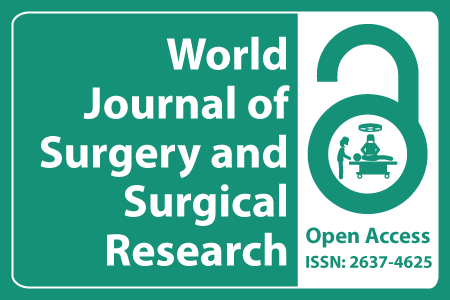
Journal Basic Info
- Impact Factor: 1.989**
- H-Index: 6
- ISSN: 2637-4625
- DOI: 10.25107/2637-4625
Major Scope
- Urological Surgery
- Hand Surgery
- Cardiac Surgery
- Endocrine Surgery
- Spine Surgery
- Hepatology
- Colorectal Surgery
- Surgery & Surgical Research
Abstract
Citation: World J Surg Surg Res. 2018;1(1):1070.DOI: 10.25107/2637-4625.1070
Burn Injury Patterns and Validation of the Abbreviated Burn Severity Index as a Predictor of Outcome in a Southwestern Nigerian Hospital
Ayodeji Olanrewaju Oladele, Anthony Alome Olekwu, Olakunle Fatai Babalola, Muhammad Habib Ibrahim and Rereloluwa Nicodemus Babalola
Department of Surgery, Obafemi Awolowo University, Nigeria
Department of Surgery, Federal Medical Centre Owo, Ondo State, Nigeria
Department of Surgery, Federal Teaching Hospital, Ido-Ekiti, Ekiti State, Nigeria
Department of Surgery, Federal Medical Centre BirninKebbi, Kebbi State, Nigeria
Department of Surgery, Obafemi Awolowo University Teaching Hospital, Nigeria
*Correspondance to: Ayodeji Olanrewaju Oladele
PDF Full Text Research Article | Open Access
Abstract:
The pattern of burn injuries are dynamic and vary between places being influenced by several factors. This informs the need for periodic review of patterns of burn injuries. Predicting burned patients outcome is important to clinical decision making, prognostication as well as optimal hospital resource allocation. Several models of achieving this have been developed, each with varying strengths and shortcomings. This study aims at describing the current pattern of acute burn injury as well as validates the Abbreviated Burn Severity Index (ABSI) as an outcome predictor in burn patients in the study setting. This is an observational study from the database of patients with burn injuries managed at the study institution over a 14 year period. The information analyzed was obtained from the clinical database of burn patients, imputed into computer software SPSS software for analysis. The total number of burn patients seen during the period was 416. Children and teenagers (0 to 20 years) were most commonly affected making up 47.8%. The mean age of patients was 23.4 years (SD=20.1 years). Burn injuries commonly resulted from flame (56%), scald (33%) and electricity (6%). A male, female ratio of 1.7:1. Inhalational injury was present in 15.6% of patients. Overall mortality was 25.2%. ABSI score was effective in the prediction of mortalities. There is an increase in the frequency of electrical burn injuries, as well as severity of burn injuries at the center and ABSI score is an effective predictor of mortality amongst patients with acute burn injury.
Keywords:
Abbreviated burn severity index; Burn injury; Prognostic burn index
Cite the Article:
Oladele AO, Olekwu AA, Babalola OF, Ibrahim MH, Babalola RN. Burn Injury Patterns and Validation of the Abbreviated Burn Severity Index as a Predictor of Outcome in a Southwestern Nigerian Hospital. World J Surg Surgical Res. 2018; 1: 1070.













